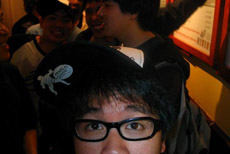
My affair with R.E.M. started when I was voraciously reading through interviews with Radiohead. Time and again, Michael Stipe’s name kept popping up and Thom Yorke would describe how he and Stipe were good friends. At the time, I decided that it wouldn’t be too bad to have an American version of Radiohead, and decided in 1998 to buy my first R.E.M. album that didn’t contain “What’s the Frequency, Kenneth?”.
I settled for New Adventures in Hi-Fi (1996), which was their latest album then. What greeted me was a sprawling mess of an album that almost didn’t seem to have any cohesiveness at all. It sounded like a band that didn’t know if it wanted to be experimental (“How The West Was Won And Where It Got Us”), or if it was going to be grungy alternative (“Wake Up Bomb”) or acoustic based (“New Test Leper”). Overall, I was a little unnerved by the whole experience, and ultimately, I was also coming to grips with my first time listening to an R.E.M. album in its entirety.
Looking back, I think it’s safe to say that this was a very transitional album, and was perhaps a milestone in chronicling the band’s sound up to that point. The question then was probably how they would take it further, or if they would simply keep doing what gave them the commercial success of Monster. As a young listener, I would constantly play the album on my stereo, trying to work out why there was something dissonant about it, a hidden layer of distress or signs of fatigue. I still knew nothing about the band in 1998, and I can’t even say that the album shaped my songwriting in any way.
However, there’s always something nostalgic about R.E.M. when I think about them today. I did go on to buy two more albums, Up (1998) and Reveal (2001), but I suppose their star was already fading then. Despite the shadow of these modern times, I sometimes find myself returning to New Adventures in Hi-Fi, listening again, trying to figure out the one album that never truly sat well with me. For once, as I’m writing this today, I think I know why – it’s rather bleak and melancholic. In fact, perhaps the saddest thing about it is that it sounds so tired. I think it’s in there somewhere, in the frequencies we can’t hear, the disquiet if you will, that reveals the strain of writing and recording the album.
“Leave” captures this perfectly, from the way the extended introduction starts and segues into a daring wah-wah riff that goes on for the entire song, to the faux ending that extends to one more cycle of the chorus, as if all they wanted to do was play that one chord they found explained everything they wanted to express, fade to black and just “leave it all behind”.
And so that’s R.E.M. for me. A rather nondescript band that was just able to empty out the bottom of their hearts even to the point of exhaustion and evoke some queer emotion in the unimpressed listener. Though it may not be for everyone, they’ve given everything they had to give and that is the triumph of the band’s 31 year career. – Brian.
mp3: R.E.M. – Leave





























I think it best to consider R.E.M. from the IRS records years to understand the band and what they meant here in America among the college kids of the 80’s, because that is where their roots and fan base started. Instead of reflecting on R.E.M when they were (in my opinion) fading away (I consider New Adventures in High FI to be the culmination of their career in the Warner Bros label years- it shows their breadth and depth, like a greatest hits collection made up of entirely new songs, recorded almost entirely while they were on the road.) I say start with the Chronic Town E.P. to see the raw energy and start of their Jangle Pop sound, listen to the difference in confidence between Murmur and Life’s Rich Pangeant, and consider their crossover to Warner with Green to truly understand the force that carried them from college radio stations to mainstream media. If you want to see where you fall in the spectrum of R.E.M. fandom, listen to Fables of the Reconstruction- their most polarizing album before they made it BIG. This band shaped my musical tastes in so many ways, I will always be indebted to them.
Hi Chris! We would have loved to capture that trajectory in greater detail, and I think the IRS years ended up being a little underrepresented in our series. Thanks for sharing! I’ve yet to listen to Fables, but now I’m very tempted to.